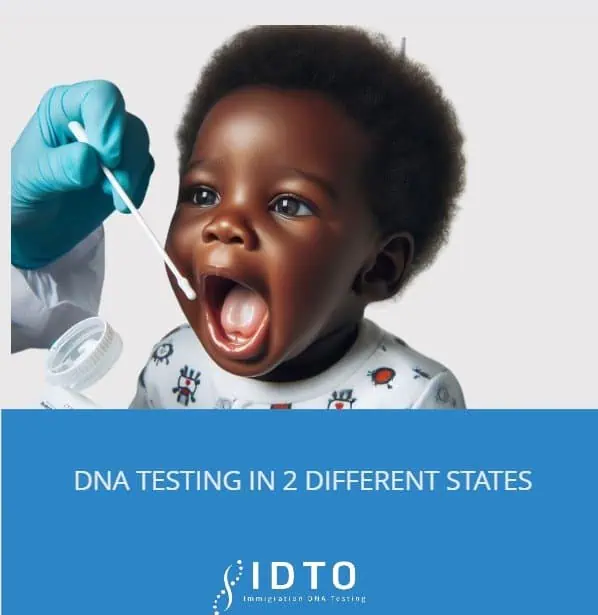DNA Testing In 2 Different States
There are situations when establishing paternity via DNA Test may require DNA samples to be collected in two different states. In this post, we will discuss if paternity testing can be performed in two different states.
Please note, the information provided in this post is for informational purposes only and should not be deemed as legal advice. Please contact a family law professional in both states to inquire about paternity establishment guidelines.

Can you perform a Paternity Test In Two Different States?
Yes. Paternity Testing can be performed if each party resides in a different state. To schedule an appointment, contact IDTO DNA Testing Center at 888-204-0583 to inquire about scheduling DNA samples collection appointments near your city.
Remember, paternity test appointment scheduling will need the cooperation of both the alleged father and mother in order to coordinate a successful DNA sample collection appointment.
Establishing paternity in two different states:
Establishing paternity when parents reside in different states can be a daunting process, but it’s definitely achievable. Here’s a breakdown of the key steps involved:
1. Determine Jurisdiction:
- Which state has jurisdiction over the paternity case depends on various factors, such as the child’s residency, the parents’ residency history, and where the child was conceived.
- Usually, the state where the child lives or has lived for the past six months has jurisdiction. However, other states might have jurisdiction if the father lived there for a specific period or if the child was conceived there.
2. Initiate Paternity Proceedings:
- The parent seeking to establish paternity (usually the mother) will file a paternity petition with the family court in the state with jurisdiction.
- If accepted, The judge will order for genetic testing and, if paternity is established, child support and visitation rights will be established
3. Serve Notice and Documents:
- The father will need to be served with the petition and other court documents, even if he lives in another state.
- This can be done through personal service (delivering the documents directly to the father) or certified mail with return receipt.
4. Genetic Testing:
- Both parents and the child will undergo DNA testing to determine paternity with near certainty.
- Courts typically order genetic testing through a court-approved laboratory to ensure accuracy and admissibility as evidence.
- Please note, if both agree a paternity test can be performed before signing a voluntary acknowledgment of paternity form. Remember, DNA Testing services we provide are performed by our partner AABB laboratory which is a criteria when submitting evidence in family court.
Additional Considerations:
- Uniform Interstate Family Support Act (UIFSA): This law simplifies child support enforcement across state lines. If a child support order is issued in one state, it can be enforced in another state through the UIFSA.
- Attorney Representation: Consulting with an attorney experienced in paternity cases in both states can be beneficial, especially if the case is complex or there are disagreements between the parents.
Additional DNA Testing
Alternative DNA testing services like Grandparent tests, Sibling tests and Avuncular Tests can also be performed when two or people reside in different states. Contact IDTO at 888-204-0583 to inquiring about appointments today.
Conclusion:
In summary, Paternity testing can be performed in two different states. Depending on your specific situation will determine the complexity on how appointment scheduling will be conducted.

